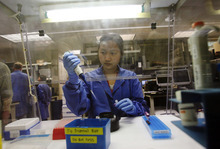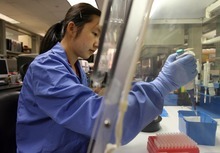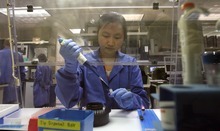This is an archived article that was published on sltrib.com in 2011, and information in the article may be outdated. It is provided only for personal research purposes and may not be reprinted.
Christine Miller is paid to lose money for her employer.
She is one of seven genetic counselors at ARUP Laboratories, a diagnostics lab at the University of Utah. It's her duty to double check that doctors are ordering the right complex genetic tests for their patients.
Mistakes happen with surprising frequency, on about 30 percent of orders, according to a white paper that Miller co-wrote with colleagues. Over an 11-month period last year, Miller's team intercepted, and canceled or changed, 1,182 misordered tests — which ARUP could have billed $402,357 to perform, no questions asked.
But catching these errors saves insurers and patients money. It improves care, sparing patients the angst of being misdiagnosed and having to undergo more testing and unnecessary treatments.
And if more widely adopted by labs and hospitals across the country, the strategy could help bend the nation's health care cost curve, Miller believes.
"Genetic counselors are trained to work with patients with rare genetic disorders on a daily basis, whereas family practitioners may see something like hereditary hemorrhagic telangiectasia (HHT) only once in their practice," she said. "There's no reason genetic counselors at hospitals can't pre-emptively review their send-outs for genetic tests. It would be a valuable service to offer."
Spending on health care in the U.S. threatens to break the bank for families, governments and employers. It surpassed $2.6 trillion last year, or 17.6 percent of the gross domestic product.
And though lab testing accounts for only about 2.3 percent of that, lab results drive 70 to 80 percent of all downstream health care decisions, according to an analysis by the industry research group Washington G-2.
—
Finding the best test » Advances in genetics hold huge promise for the future of medicine, including reducing costs. Knowing if you or your family members are at risk for inheriting a disease can help you avoid certain lifestyle or environmental triggers.
But the wrong testing can have expensive and harmful ripple effects, said Brian Jackson, a pathologist and director of medical informatics at ARUP. ARUP works with hundreds of hospitals across the country, and sees a wide variation in the tests that doctors order for patients in similar scenarios.
In some cases that's because clinical standards haven't been developed.
Several studies, for example, have shown that screening every new colon cancer patient for Lynch syndrome, a familial disorder responsible for 3 to 5 percent of colorectal tumors, to be worth the trouble and price. But Marc Williams, clinical genetics director at LDS Hospital in Salt Lake City, said, "There's some question as to which tests are the most effective and efficient."
Doing a full genome sequencing on all patients would uncover virtually all mutations — at a cost upward of $4,000. But since most colon cancer patients don't have the syndrome, Williams set out to find a more cost-efficient but clinically viable approach with experts at ARUP and the Huntsman Cancer Institute.
They settled on a set of guidelines using two types of tumor tests and published their findings last week in the American Journal of Managed Care.
In some cases, as with Lynch syndrome, knowing which genes are involved enables doctors to better tailor treatment.
"This form of colon cancer has a generally better prognosis than sporadic colon cancer, but it doesn't respond as well to certain kinds of chemotherapy," said Williams.
—
Trying triage » But not all tests are definitive, and some are for diseases for which there is no treatment or cure. The new and rapidly evolving technologies, and expertise to perform and interpret tests, can be expensive, said Elaine Lyon, an associate professor of pathology at the U. and ARUP's medical director of molecular genetics.
Genetic testing is only a small part of the lab's business, about 10 percent, she said, but an important and growing part.
ARUP started triaging orders, and asking doctors to fill out forms with relevant details about their patients' medical histories, about seven years ago. The information is used to personalize test interpretations and ensure the most cost-effective test is chosen.
Miller isn't aware of other large reference labs going the extra step of canceling misguided tests.
She sensed that ARUP genetics was heading off a lot of wrong tests but was surprised, upon closer inspection, by just how many — more than 100 a month for an average cost savings of $36,451.
She presented her findings at a national conference last March. And her work has caught the attention of the National Society of Genetic Counselors, which wants her to publish the data.
One common mistake: Orders for full gene sequencing when testing for common mutations, or a single mutation, would suffice.
"I describe it like a book. With sequencing you're reading the whole book, whereas with targeted testing, you're turning to a chapter where you know problems commonly occur," explained Miller. "For a patient, that can be the difference between spending $1,700 or $300," she said.
A slim number, 9 percent, of misorders are for duplicate tests that have already been performed. But most, 68 percent, are simply for the wrong test.
—
Making a crucial call » Miller recalls an order for HHT, a disorder that leads to abnormal blood vessel formation, that was supposed to be for HH, or hereditary hemochromatosis, which causes the body to absorb and store too much iron.
And once a pathologist mistakenly asked to sequence a woman's MSH6 gene, one of four that ARUP tests for Lynch syndrome.
The doctor didn't send a patient history, so Miller called him and discovered that a family member had already tested positive, but for a mutation in the MSH2 gene.
"If we ran the test as prescribed we would have tested the wrong gene and the woman might have assumed she was disease-free and missed out on life-saving colonoscopies," Miller said.
Few doctors let pride stand in the way of good patient care and most are grateful for the backup.
The lab has a do-not-call list comprising less than 1 percent of its clients. An example is a biochemical geneticist with a refined sense of what he wants, said Lyon. "We've established a relationship with him."
And it's not all pain, no gain, for ARUP.
Lyon explains that the reports she writes provide context to help doctors and patients make sense of genetic findings. "If I spend less time on unnecessary tests, I can put that time into another patient," she said. "It's a better use of resources."









